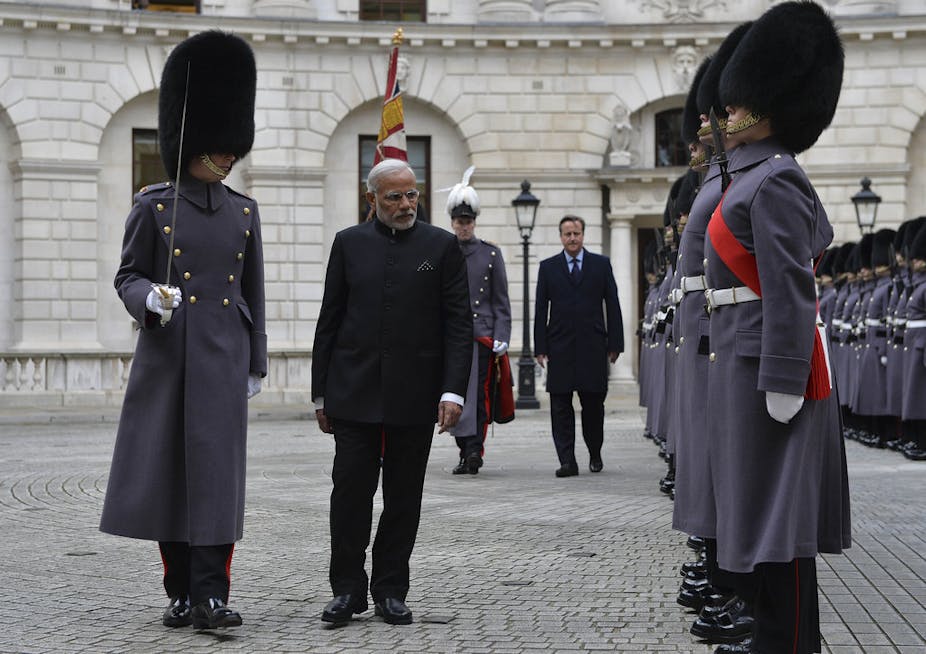Wembley, the Red Arrows, fireworks and an “Olympic-style” welcome. All this for Narendra Modi, a man who, from 2002-2012, was barred from the UK for human rights abuses. So how do we explain such a turnaround?
The official reason that the ban on Modi was lifted in 2012 was that he had been legally exonerated from any wrong-doing in an anti-Muslim pogrom in Gujarat that left more than 1,000 people dead. But with Modi in 2012 already expected to become prime minister of one of the world’s great emerging powers, there were clearly other considerations at play.
One unnamed British official in Delhi conceded to The Guardian that lifting the ban would “broaden and advance commercial interests” . There were, the official warned, “opportunity costs to not engaging”.
As the theme of the reception – “Two Great Nations. One Glorious Future” – implies, Modi has clearly been completely rehabilitated in Britain’s official eyes. The rhetoric helps to erase the memory of violence which has followed Modi’s career and which has left a troubling legacy, as testified by the horrific acts of violence perpetrated against Muslims and other marginal groups in India by supporters of Modi’s Bharatiya Janata Party, the BJP. This has continued since the BJP took power last year and Modi has done nothing to halt or condemn them.

Of course, violence in India is not an unfamiliar concept to Modi’s hosts. And in order to truly understand the reason for his rehabilitation in the UK we need to consider not only Modi’s inglorious past, but Britain’s.
Framing India and Britain simply as two great nations with a “glorious future” conveniently sidesteps the fact that Britain conquered and then colonised the Indian subcontinent; a colonisation that depended on violence. The exoneration of Modi and his celebratory visit to the UK reveal less about the ways in which Modi has managed to reinvent his past than they do about the way Britain has.
Rogue state
In fact, Britain has skilfully employed the same style of rhetoric to silence the violence of its colonial past. Crucially, that has seen the responsibility for endemic, systemic violence transitioned onto what English professor Purnima Bose refers to as “rogue colonial individuals”.
A rogue colonial individual is an official who is essentially criminalised for engaging in excessive brutality against “natives” as a means of distancing the colonial regime from its violence. Bose uses the example of General Reginald Dyer and the Amritsar massacre to illustrate how this process works.
On April 13, 1919, Dyer ordered his soldiers to fire on an unarmed crowd of between 10,000 and 20,000 unarmed people who had gathered in an enclosed compound known as Jallianwala Bagh, in the Punjabi city of Amritsar. They were holding a protest meeting against the Rowlatt Act, which allowed for detention without trial.
Dyer gave no warning before his troops began firing a hail of bullets that lasted ten minutes which only ceased when they ran out of ammunition. Carnage followed and, according to one estimate, there was a death toll of more than a thousand people, with 1,200 others wounded.

Convenient silence
In India, Dyer rapidly acquired the epithet “the Butcher of Amritsar”. The main political organ of anti-colonial opposition in India, the Indian National Congress, referred to him in its report on the massacre as “depraved” and his actions a “crime against humanity”.
In Britain reaction to Dyer’s actions was mixed. For supporters, such as Rudyard Kipling, Dyer was “the man who saved India” by staving off a rebellion, even though the official investigation into the massacre concluded there were no signs of this erupting. Opponents, on the other hand, regarded Dyer’s behaviour as barbaric, exceptional and aberrant. The secretary of state for India, Edwin Montagu, even accused Dyer of operating under a “doctrine of terrorism”.
But in rendering colonial violence as something anomalous, perpetrated by a rogue individual in a random act, rather than a central element of colonial rule, such rhetoric served ultimately to erase the endemic nature of colonial violence. It usefully obscured the reality, as one critic observed in the parliamentary debates on Dyer, that Britain held India “by force – undoubtedly by force”. Dyer’s actions were the physical manifestation of the threat of violence which underscored colonial rule.
We can also view Modi as a “rogue individual”. Or, significantly, as a “rogue post-colonial individual”, whose behaviour had been singled out by the British government for its violation of civilised norms. But unlike Dyer, Modi is the central figure in the commercial and political interests now at play between India and the UK. While “the Butcher of Amritsar” was a useful device to draw a veil over endemic colonial violence, it now serves Britain to rehabilitate Modi, and draw a veil over systemic post-colonial violence too. Modi’s rehabilitation is simply another useful act of silencing.

